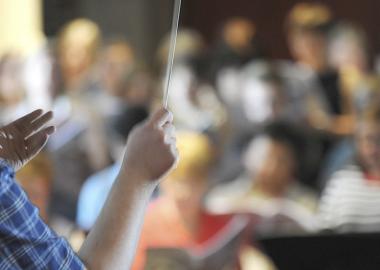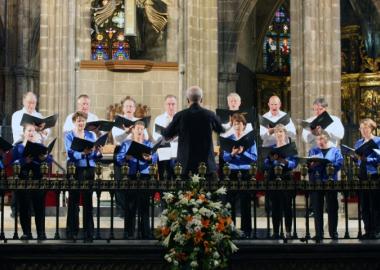Will Prideaux, Director of Peterborough Sings! and a Trustee on the Making Music board, provides some practical tips and hints on how to ensure a productive cooperation between your music director and committee.
A successful ensemble relies on more than what happens in rehearsal. Behind every well-run outfit is a relationship that rarely gets much attention: the one between the conductor/music director and the committee. When it works well, everything tends to function smoothly. When it doesn’t, frustrations can mount on both sides. Having worked with a variety of groups over the years, I’ve come to appreciate just how central this relationship is to the health of the whole organisation.
The first step is clarity. Most difficulties I’ve encountered stem from uncertainty about roles — who makes which decisions? Where do the musical and administrative responsibilities begin and end? These aren’t always obvious, particularly when someone is new to the group or when informal habits have taken root over time. A conversation at the outset about who handles what can save a great deal of confusion later on. These conversations don’t need to be overly formal, but they do need to happen.
Once the basics are in place, keeping in touch becomes crucial. It’s very easy for musical and organisational efforts to operate in separate lanes. In choirs where conductor and committee don’t regularly check in, small misunderstandings can grow quickly. A brief chat before rehearsal, a shared document, or a scheduled meeting once a term can go a long way. The goal is not to over-complicate things, but to keep everyone on the same page.
It also helps to remember that you’re both bringing essential skills to the table. The committee often includes people with deep experience in logistics, budgeting, publicity, and the practical realities of keeping a group going. Respecting that experience is as important as expecting your own musical judgment to be respected in return. Groups function best when these forms of leadership complement rather than compete with each other.
Compromise is inevitable. The conductor might fall in love with a piece that’s too expensive to hire or too complex to programme this term. The committee might want to perform in a venue that’s acoustically uninspiring but financially sensible. Rather than seeing this as a clash, it can be a shared problem to solve — a bit of flexibility on both sides usually leads to a better solution than either party might reach alone.
Above all, don’t forget to acknowledge the work that’s being done. A quick thank-you after a concert, a note of appreciation at the end of term — these small gestures help build trust and goodwill. After all, most people involved are giving their time because they care deeply about the group.
When conductor and committee work well together, the impact is felt by everyone. Rehearsals run more smoothly, concerts are better organised, and the whole atmosphere improves. It’s a partnership worth getting right.
Useful resources:









